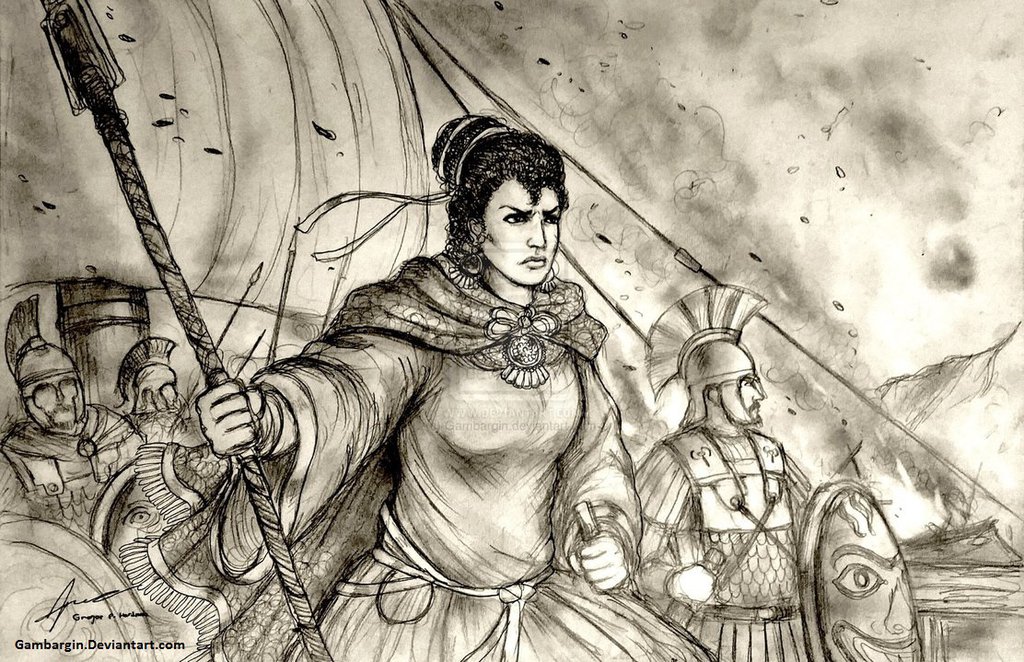Artemisia of Caria aka Artemisia I
‘I pass over all the other officers [of the Persians] because there isno need for me to mention them, except for Artemisia, because I find it particularly remarkable that a woman should have taken part in the expedition against Greece. She took over the tyranny after her husband’s death, and although she had a grown-up son and did not have to join the expedition, her manly courage impelled her to do so…Hers was the second most famous squadron in the entire navy, after the one from Sidon. None of Xerxes’ allies gave him better advice than her (VII.99).’
Herodotus, Battle of Salamis
Also known as Queen Caria I, born sometime during the fifth century, Artemisia is known for her exploits as the only female commander during the Greek-Persian wars – and also the world’s first known female captain of a naval fleet. She was named after the Goddess of the Hunt, Artemis, who was sister to Apollo.
Her father was the King of Halicarnassus and mother was from Crete; typically, at a time when most women were anonymous, we don’t know the name of her mother. That we even know of Artemisia (most of the information comes from her fellow Halicarnassusian, the historian Herodotus, aka The Father of History) speaks volumes about her exploits and her reputation.
She was married off to the King of Caria (part of Persia located in modern day Turkey) who died in mysterious circumstances and whose name we also don’t know, leaving her with a young son, Pisindelis. She took over as Regent for her son, running the kingdom which also included the nearby islands of Kos, Nisyros and Kalymnos.
Immortalised in the film 300 Rise of an Empire, her character is vividly brought to life by the incredible Eva Green, who says that whilst researching the character, “I found out that she was very different from the movie. She was a very brave woman commander, but she was in love with Xerxes, so it’s a complete different story. And I kind of got inspired more by Cleopatra, or Lady Macbeth, you know, kind of bloodthirsty characters…”
Artemisia fought for Xeres and together with the five ships she brought to the fight, was the naval commander and brilliant tactician, in the Persian navy against the Greeks during the Battle of Salamis in 480 BC. Ruthless in battle, she would carry two flags on board, one Greek and the other Persian. On approaching a Greek ship, she’d fly their flag on her own vessel to fool them, then attack.
Her ally Xerxes, watching the battle from his throne atop Mount Egaleo, refused to take her advice to continue the fight against the Greeks on land. He attacked the Greek fleet again by sea on 29 September 480BC and Artemisia had no choice but to fight for him again.
The Greeks were seriously annoyed that Artemisia was waging war against them and offered a reward 10,000 drachmas for her capture. The reward was never claimed.
The brother of Xerxes, an admiral in the fleet, was killed in battle and Artemisia was tasked with retrieving the body. She deliberately smashed one of her own ships into a Persian one, in order to fool the oncoming Greeks that she she was one of them. At this audacious manoevre, Xerxes is rumoured to have exclaimed: “My men fight like women, and my women like men!”
Ultimately however, having ignored her military advice, Xerxes suffered a dreadful defeat at the Battle of Salamis. He trusted Artemisia her so implicitly that he allowed her to accompany his illegitimate children to Ephesus on the Ionian coast (also modern day Turkey). Maddeningly, after that she disappears from historical record.
Herodotus, aka the Father of History and a fellow citizen of Halicarnassus:
“Her brave spirit and manly daring sent her forth to the war, when no need required her to adventure. Her name, as I said, was Artemisia.” -Herodotus (The Histories)
Her death remains a mystery, although some unsubstantiated reports, which are not even remotely in keeping with what we know of her character, suggest she threw herself off a cliff in an act of unrequited love for a younger man called Dardanus.

